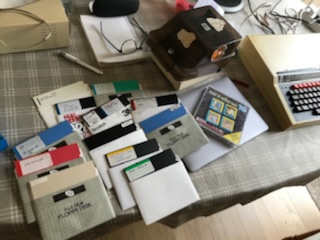Finally! DDOS2ADFS utility
For those people struggling with a treasure trove of Opus DDOS format floppy discs. . .

After much fiddling, I’ve finally written a custom transfer program: DDOS2ADFS. That’s a link to a GitHub repo, DDOS2ADFS is stored in tokensied BASIC form and *SPOOL’d ASCII.
My problems with using TreeCopy (v1.61b), as far as Opus DDOS is supported, were:
- When asking for “All subdirs”, it seemed to act up - it might be scanning each DFS folder from A-Z etc., the drive was making interesting noises!
- The disc sides weren’t just 0 & 2, but 0A, 0B, .., 0H and 2A, .., 2H - which needed manual selection each time - and then a matching destination folder in ADFS.
So, the BASIC program I’ve written:
- Scans the DDOS sectors on track 0 to discover what DDOS drive volumes are allocated
- Scan each DDOS volume catalogue to read which files are present - and extract load & execution addresses, along with file length
- Uses
OSWORD &7Fto read sector data - Uses
OSGBPB 1andOSGBPB 3to read and write chunks of data - Plain
OSCLIto*SAVEas a lazy way of setting load & execute addresses OSCLIto*CDIRand*DIRinADFSas required- Drive volumes in DDOS are mapped to subfolders in
ADFS, so volume0Cmaps to folder:0.$.0Aon ADFS - Files in folder
$are copied to the root of the relevant volume folder - All other folders have a matching subfolder created in the relevant volume folder
Oddly, when using *LOAD in DDOS, then calling *ADFS to switch filing systems caused ADFS to lock solid - ESCAPE didn’t work, had to use BREAK. This was circumvented by using OPENIN in BASIC and then OSGBPB to read the raw data - which has the advantage of being able to read a block of data from anywhere in the file.
OSGBPB enabled me to chunk large files - if the data wouldn’t fit in memory, then it could be loaded and saved in multiple passes. HIMEM was set to be LOMEM+&1800 - I have used way more memory than necessary due to long variable names. The code should be legible also neat’n’tidy with LOCAL variables - but that comes with a memory overhead. I’ll take the hit for ease of maintenance.
However, given that this script was written just to copy Opus DDOS 720k floppy discs to ADFS 640k images on a GoTEK, I could make a fair few assumptions - and could use the folder layout I wanted. It didn’t matter if it took many switches between file systems, as no physical media had to be swapped, and I could just leave it to run.
Hopefully there aren’t any bugs - still being tested… but files seem to have landed safely :)
Any comments, I’ll be on stardot.org & (allegedly) the GitHub repo for the code will accept issues.
